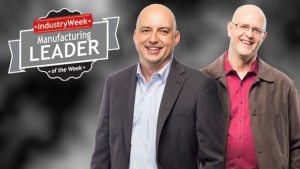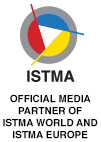Plex Geeks Dive Into Manufacturing Technology
07.11.2016
Plex Systems CTO Jerry Foster and VP of development Jason Prater discuss what they're at work on in the cloud and what they see for the future of manufacturing technology ... and why we won't all become robotic drones of death.
Plex Systems CTO Jerry Foster and VP of development Jason Prater discuss what they're at work on in the cloud and what they see for the future of manufacturing technology ... and why we won't all become robotic drones of death.

Jerry Foster and Jason Prater have worked together for so many years that whenever they team up — for a presentation, for a product pitch, even for just a conversation in a windowless conference room at the end of a long day in front of customers — they have an innate ability to play off each other and finish each other’s thoughts. They are a little like brothers, or the best friends who somehow landed in the same classroom every year from kindergarten through graduation.
Foster is the chief technology officer at Plex Systems, a Michigan software company that focuses on ERP, the cloud and emerging technologies. Prater is the vice president of development there. They sat down recently to dive into current and future projects, and the current and future state of manufacturing technology. Their enthusiasm and senses of humor kept the talk focused and light.
IndustryWeek: Earlier today, you two delivered a talk about incorporating new technologies into manufacturing. When discussing the Internet of Things, you said, “Don’t get caught up in the hype. IoT is only as important as how you can use it.” Hype is good, but it’s an acronym. It’s short for Hope You Practiced Enough. Let’s start with IoT, IIoT: What are you guys working on behind the scenes, or what do you see in the next six or 12 months?
Jerry Foster: A lot of it is, for me, our IoT is really centered around our wearables right now. It’s cool stuff, but as we look at what’s coming down the pipe, my team is going to be looking into some technology partners, some technology platforms, because IoT is just integrated with Big Data. They go hand in hand, they’re just two buzzwords that stick together. We want to make sure we have solutions when our customers come to us with questions.
For More about the Internet of Things, check out the IW IoT page
Jason Prater: Right now, our customers, especially in automotive, they’re just getting hammered for capacity, and they’re all terrified to grow, they’re all terrified to spend money — and that’s because of what happened in the recession. Like my family business, it got wiped out. They’re all very capital-sensitive right now, so they’re going to run super efficiently. You’re going to see more sensors in manufacturing. The whole idea of SBC will die in the next decade, because you won’t need to do it.
Sensors: Last year, Detroit had a big rain storm and the city flooded. There were thousands of cars in the underpasses and a customer was worried about warranty claims coming back on products, that they’re now defective on products that he can’t confirm are flooded or not. So we talked about putting sensors on all his products. They'll justify the cost.
The next thing will be connected devices. Especially for more complex manufacturers, of course connected is the future.
IW: Privacy always seems to be a big deal when it comes to connected devices. (This conversation was conducted prior to the headline-grabbing Jeep hacking and the subsequent Fiat Chrysler recall.)
Prater: I’m the technology optimist. I believe that technology will be used for bad things only when bad people get a hold of it. Jerry is a realist —
Foster: — and bad people will get a hold of it.
IW: Everything has to be secured. It’s just the first step.
Prater: It’s always interesting to see how consumers are different in different parts of the world. We have a lot of European customers, and they are fanatical about it. … They just have a very different perspective, even before (Edward) Snowden. Connected products that are relaying data back to somebody else, and they don’t know about it, they don’t have control over it, I think different markets will have radically different expectations. In the U.S., it will be a little more flexible — my toaster will tell me it’s going to catch fire before it actually catches fire, I’m cool with that — but in other parts of the world, they are not going to let that happen.
IW: There will always be cynics — I think it was Steve Wozniak who said IoT is a bubble — and there are people who dismiss it just because it’s a buzzword. People who are skeptical: How do you deal with them?
Prater: When we did our survey, we asked all our customers, we collected all this data, and we found that people who use sensors — and react to those sensors — have 5% better margins. We have this unique opportunity to take survey answers, match them up to benchmark data and drive more analysis around it.
Foster: I have a lot of distaste for buzzwords, but buzzwords start, like rumors, because there’s a nugget of truth in there somewhere. I feel like it’s my job to find it.
Prater: We released our Google Glass pilot the day they stopped selling it to consumers — at least within days of each other. The mainstream media had given up on it, but it’s a product for us now. Yeah, there is a hype cycle — buzzwords — and then there’s actual value.













































